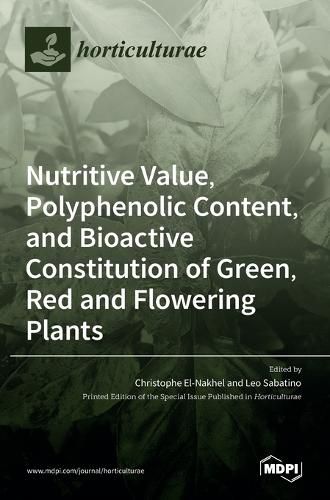Readings Newsletter
Become a Readings Member to make your shopping experience even easier.
Sign in or sign up for free!
You’re not far away from qualifying for FREE standard shipping within Australia
You’ve qualified for FREE standard shipping within Australia
The cart is loading…






This title is printed to order. This book may have been self-published. If so, we cannot guarantee the quality of the content. In the main most books will have gone through the editing process however some may not. We therefore suggest that you be aware of this before ordering this book. If in doubt check either the author or publisher’s details as we are unable to accept any returns unless they are faulty. Please contact us if you have any questions.
Plants, including vegetables, are an essential element of the human diet, considering their dense nutritional content and bioactive content that could assist in boosting nutritional quality and food security. Plants are exhibiting a colossal rebound in the context of healthier lifestyles, especially as functional foods empowered with bioactive phytochemicals; they synthesize uncountable ecochemicals via secondary metabolism, which command medical and socioeconomic significance. Among these secondary metabolites, phenolic compounds are of prime interest and are largely present in medicinal plants, herbs, vegetables, and flowers. These metabolites are at the helm of the bitterness, color, and scent of plants, and are correlated to the beneficial health qualities expressed by the antioxidant capacity. The accretion of these health-promoting phytochemicals depends chiefly on the genetic material and the maturity stage at harvest, notwithstanding the main role that is played by preharvest factors, i.e., eustress, fertilization, irrigation, light, biostimulants, biofortification, and other agronomic practices. This Special Issue is a collection of 11 original research articles addressing the quality of seeds, microgreens, leafy vegetables, herbs, flowers, berries, fruits, and byproducts. Mainly preharvest factors were assessed regarding their effect on the qualitative aspects of the aforementioned plants.
$9.00 standard shipping within Australia
FREE standard shipping within Australia for orders over $100.00
Express & International shipping calculated at checkout
This title is printed to order. This book may have been self-published. If so, we cannot guarantee the quality of the content. In the main most books will have gone through the editing process however some may not. We therefore suggest that you be aware of this before ordering this book. If in doubt check either the author or publisher’s details as we are unable to accept any returns unless they are faulty. Please contact us if you have any questions.
Plants, including vegetables, are an essential element of the human diet, considering their dense nutritional content and bioactive content that could assist in boosting nutritional quality and food security. Plants are exhibiting a colossal rebound in the context of healthier lifestyles, especially as functional foods empowered with bioactive phytochemicals; they synthesize uncountable ecochemicals via secondary metabolism, which command medical and socioeconomic significance. Among these secondary metabolites, phenolic compounds are of prime interest and are largely present in medicinal plants, herbs, vegetables, and flowers. These metabolites are at the helm of the bitterness, color, and scent of plants, and are correlated to the beneficial health qualities expressed by the antioxidant capacity. The accretion of these health-promoting phytochemicals depends chiefly on the genetic material and the maturity stage at harvest, notwithstanding the main role that is played by preharvest factors, i.e., eustress, fertilization, irrigation, light, biostimulants, biofortification, and other agronomic practices. This Special Issue is a collection of 11 original research articles addressing the quality of seeds, microgreens, leafy vegetables, herbs, flowers, berries, fruits, and byproducts. Mainly preharvest factors were assessed regarding their effect on the qualitative aspects of the aforementioned plants.